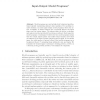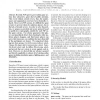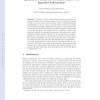75 search results - page 5 / 15 » Problem Solving: The Essence of Player Action in Computer Ga... |
ICTAC
2009
Springer
14 years 3 months ago
2009
Springer
Abstract. Model programs are used as high-level behavioral specifications typically representing abstract state machines. For modeling reactive systems, one uses input-output mode...
FORMATS
2010
Springer
13 years 6 months ago
2010
Springer
In an expected reachability-time game (ERTG) two players, Min and Max, move a token along the transitions of a probabilistic timed automaton, so as to minimise and maximise, respec...
CIG
2005
IEEE
14 years 2 months ago
2005
IEEE
Abstract- Recently, P2P (peer-to-peer) online game systems have attracted a great deal of public attention. They work without central servers, thus, the maintenance and organizatio...
ICALP
2009
Springer
14 years 3 months ago
2009
Springer
Abstract. We study a model of games that combines concurrency, imperfect information and stochastic aspects. Those are finite states games in which, at each round, the two players...
SIGECOM
2006
ACM
14 years 2 months ago
2006
ACM
In traditional game theory, players are typically endowed with exogenously given knowledge of the structure of the game—either full omniscient knowledge or partial but fixed in...




